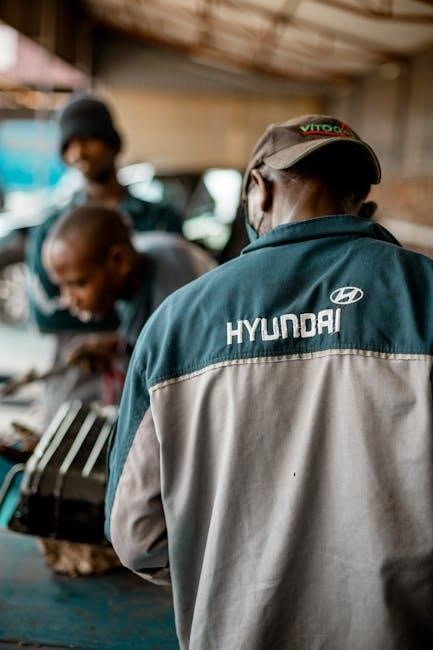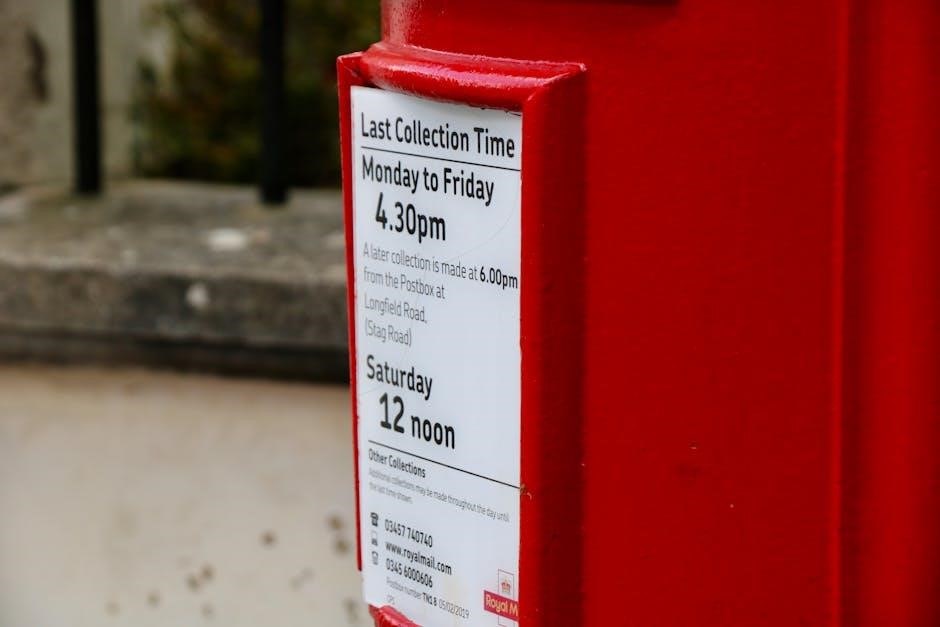
Regular maintenance is essential for optimal performance and longevity of your Hyundai Elantra. The service schedule outlines necessary checks and replacements to ensure reliability and efficiency.
By following the recommended intervals‚ you can prevent potential issues‚ maintain fuel efficiency‚ and uphold your vehicle’s warranty. This guide helps you stay on track with essential care.
Overview of the Importance of Regular Maintenance
Regular maintenance is crucial for ensuring your Hyundai Elantra performs optimally and maintains its longevity. It helps prevent unexpected breakdowns‚ reduces repair costs‚ and ensures safety on the road. By following the recommended service intervals‚ you can identify and address potential issues early‚ preventing them from becoming major problems. Proper maintenance also preserves fuel efficiency‚ enhances overall performance‚ and maintains the vehicle’s resale value. Neglecting scheduled maintenance can lead to premature wear and tear‚ compromising both reliability and safety. Consistent care ensures your Hyundai Elantra runs smoothly for years to come.
Why Following the Service Schedule is Crucial for Hyundai Elantra Owners
Adhering to the Hyundai Elantra service schedule ensures your vehicle remains in peak condition‚ optimizing performance and fuel efficiency. Regular maintenance prevents costly repairs by identifying issues early‚ thus extending the lifespan of your car. It also maintains your warranty‚ providing peace of mind and financial protection. Proper care enhances safety‚ ensuring all systems function reliably. Neglecting scheduled services can lead to breakdowns‚ compromising both safety and convenience. Staying on track with recommended maintenance ensures your Hyundai Elantra delivers consistent reliability and drives smoothly for years.

Maintenance Intervals for Hyundai Elantra
Regular maintenance every 6 months or 7‚500 miles‚ and annually or 15‚000 miles‚ ensures optimal performance and longevity of your Hyundai Elantra.
Every 6 Months or 7‚500 Miles Service Requirements
Regular maintenance every 6 months or 7‚500 miles is crucial for your Hyundai Elantra’s health. This interval typically includes an oil and filter change‚ tire rotation‚ and a multi-point inspection. During the inspection‚ technicians check essential components like brakes‚ belts‚ and fluids. Ensuring these tasks are performed helps prevent wear and tear‚ maintains fuel efficiency‚ and keeps your vehicle running smoothly. Adhering to this schedule is vital for extending the life of your car and avoiding potential issues down the road. Always consult your owner’s manual or service schedule PDF for detailed requirements. Proper maintenance is key to optimal performance and reliability.
Every 12 Months or 15‚000 Miles Service Requirements
At every 12 months or 15‚000 miles‚ your Hyundai Elantra requires essential maintenance to ensure optimal performance. This service typically includes replacing the engine oil and filter‚ rotating the tires‚ and conducting a multi-point inspection. During the inspection‚ technicians check critical components like belts‚ hoses‚ and the battery to ensure they are in good condition. Additionally‚ the air filter may be replaced to maintain proper airflow and fuel efficiency. This interval is a cornerstone of the maintenance schedule‚ helping to prevent potential issues and keep your vehicle running smoothly and efficiently. Always refer to your owner’s manual or service schedule PDF for specific requirements.
Additional Mileage-Based Maintenance Recommendations
Beyond the standard intervals‚ additional services are recommended at specific mileages to ensure your Hyundai Elantra remains in top condition. At 30‚000 miles‚ replace the cabin air filter and inspect belts for wear. At 60‚000 miles‚ spark plugs should be replaced‚ and the drive belts may need attention. Coolant replacement is typically required at 90‚000 miles‚ while transmission fluid may need servicing around 105‚000 miles. Brake fluid should be replaced every 30‚000 miles. These additional recommendations help maintain performance‚ prevent wear‚ and ensure longevity of your vehicle’s critical systems. Always consult your service schedule PDF for detailed guidance.

Understanding the Service Schedule
The Hyundai Elantra service schedule PDF guides owners through regular maintenance intervals‚ ensuring optimal vehicle performance and longevity. It outlines required services at specific mileages to maintain reliability and efficiency.
How to Read and Interpret the Hyundai Elantra Service Schedule PDF
The Hyundai Elantra service schedule PDF is structured to help owners easily identify required maintenance at specific intervals. It typically includes a table or chart listing mileage checkpoints and corresponding services‚ such as oil changes‚ tire rotations‚ and inspections. Users can navigate the document by referencing sections like “Maintenance Intervals” or “Service Requirements.” Symbols and notes clarify tasks‚ while detailed descriptions guide DIYers or inform those visiting a dealership. Understanding the schedule ensures timely care‚ preventing issues and maintaining performance. Always refer to the PDF for accurate‚ model-specific recommendations tailored to your vehicle’s needs.
Key Components of the Maintenance Schedule
The Hyundai Elantra maintenance schedule includes essential services like oil changes‚ tire rotations‚ and multi-point inspections. It outlines specific intervals‚ such as every 6 months or 7‚500 miles‚ and 12 months or 15‚000 miles. Additional recommendations are provided for higher mileage vehicles‚ ensuring comprehensive care. The schedule also covers fluid checks‚ brake inspections‚ and battery health; By following these components‚ owners can ensure their vehicle runs efficiently‚ maintains safety‚ and avoids costly repairs. Proper adherence to the schedule preserves the car’s value and performance over time.

Fluid Checks and Top-Offs
Regular fluid inspections ensure optimal performance and prevent damage. Check engine oil‚ coolant‚ brake fluid‚ and transmission fluid levels‚ topping them off as needed to maintain proper function.
Importance of Regular Fluid Inspections
Regular fluid inspections are crucial for maintaining your Hyundai Elantra’s performance and longevity. Engine oil‚ coolant‚ brake fluid‚ and transmission fluid play vital roles in lubrication‚ temperature regulation‚ and system operation.
Neglecting fluid checks can lead to overheating‚ reduced braking efficiency‚ or transmission failure. Consistent inspections ensure fluids are at proper levels and free from contamination‚ preventing costly repairs and extending vehicle lifespan.

Which Fluids to Check and Top Off
Regularly inspect and top off essential fluids in your Hyundai Elantra to ensure optimal performance. Engine oil lubricates the engine‚ while coolant prevents overheating. Brake fluid is vital for proper braking‚ and transmission fluid ensures smooth gear shifts. Additionally‚ check the windshield washer fluid for visibility and battery fluid levels for electrical system health.
Refer to your service schedule for specific intervals‚ typically every 6 months or 7‚500 miles. Proper fluid maintenance prevents breakdowns‚ enhances efficiency‚ and extends your vehicle’s lifespan.

Tire Care and Maintenance
Proper tire care ensures safety‚ handling‚ and fuel efficiency. Regular rotation and pressure checks are crucial for even tread wear and optimal performance.
Proper Tire Rotation Patterns for Hyundai Elantra
Regular tire rotation ensures even tread wear and extends tire life. For Hyundai Elantra‚ the recommended pattern is a rearward cross‚ moving front tires to the rear on the opposite side. This method‚ outlined in the owner’s manual‚ should be performed every 6 months or 7‚500 miles. Proper rotation improves handling‚ traction‚ and overall safety. Always refer to the service schedule for specific guidelines tailored to your vehicle’s drivetrain‚ whether front-wheel or all-wheel drive‚ to maintain optimal performance and prevent uneven wear.
Recommended Tire Pressure Levels
For optimal performance and safety‚ Hyundai Elantra tire pressure should be set to the manufacturer-recommended levels‚ typically 30-35 PSI for front and rear tires. Ensure to check the owner’s manual or the tire information placard on the driver’s side doorjamb for specific guidance. Proper inflation enhances fuel efficiency‚ handling‚ and safety. Check tire pressure when tires are cold for an accurate reading. Adhering to these levels helps extend tire life and ensures a smooth driving experience.

Brake System Maintenance
Regular brake inspections are crucial for safety and performance. Ensure brake pads are checked and replaced as needed‚ and brake fluid levels and condition are monitored.
When to Inspect and Replace Brake Pads
Inspect brake pads every 12‚000 miles or as indicated by your Hyundai Elantra service schedule. Look for signs of wear‚ such as thinning pads or squeaking noises. Replace pads when worn below 1/8 inch. Proper maintenance ensures safety and prevents rotor damage. Always refer to the service schedule PDF for precise guidelines and consult a certified Hyundai technician for professional inspection and replacement. Regular checks help maintain braking performance and avoid costly repairs. Stay proactive to ensure your vehicle remains safe and reliable on the road.
Brake Fluid Level and Condition Checks
Check the brake fluid level every 6 months or 7‚500 miles‚ as per the Hyundai Elantra service schedule. Ensure the fluid reservoir is between the minimum and maximum marks. Inspect for signs of contamination‚ such as dark color or particles. If the level is low‚ inspect for leaks. Replace brake fluid every 30‚000 miles or as recommended. Proper brake fluid condition ensures reliable braking performance and prevents system damage. Always refer to the service schedule PDF for detailed instructions and consult a certified technician if issues arise. Regular checks help maintain safety and prevent costly repairs.

Battery Maintenance
Regular battery checks are crucial for reliable starting and electrical system performance. Inspect for corrosion‚ cracks‚ or wear. Test battery health every 3 years or as needed.
How to Check Battery Health
Start by visually inspecting the battery for signs of damage‚ corrosion‚ or wear. Clean the terminals if necessary using a wire brush and baking soda solution.
Use a multimeter to measure voltage with the engine off (should be around 12.4-12.7V). Turn on headlights for 10 minutes‚ then measure voltage again (should be above 10V).
If voltage drops below 10V‚ the battery may need recharging or replacement. Hyundai recommends testing battery health every 3 years or as indicated by the owner’s manual.
When to Replace the Battery
Replace the battery if it shows signs of weakness‚ such as slow engine crank‚ dim headlights‚ or difficulty starting the car. Age is a key factor—most batteries last 3-5 years.
If your Hyundai Elantra is 5 years or older‚ consider a professional test. Corrosion‚ swelling‚ or a voltage drop below 10V indicates the need for a new battery.
Always refer to the owner’s manual or consult a Hyundai-certified technician for precise replacement intervals and recommendations tailored to your vehicle’s condition.

Spark Plugs and Air Filters
Regular spark plug replacements ensure optimal combustion‚ while clean air filters improve fuel efficiency. Both should be maintained as per the recommended service intervals.
Recommended Spark Plug Replacement Intervals
Spark plugs in your Hyundai Elantra should be replaced every 105‚000 miles or as specified in your owner’s manual. Proper replacement ensures optimal engine performance and fuel efficiency. Neglecting this can lead to degraded combustion‚ misfires‚ and reduced power. Always use genuine Hyundai spark plugs for reliability. Regular inspections during routine maintenance can help identify worn-out plugs early. Follow the schedule to maintain your vehicle’s health and avoid costly repairs. This interval applies to most Elantra models‚ but verify specifics for your model year in the service schedule PDF.
Importance of Air Filter Cleaning and Replacement
Regular air filter cleaning and replacement are vital for maintaining your Hyundai Elantra’s performance and fuel efficiency. A dirty air filter can restrict airflow‚ reducing engine power and increasing fuel consumption. It is recommended to inspect and replace the air filter every 15‚000 to 30‚000 miles‚ depending on driving conditions. Dusty or polluted environments may require more frequent changes. A clean air filter ensures proper combustion‚ better mileage‚ and reduced emissions. Neglecting this can lead to decreased performance and potential damage to the engine. Always refer to your service schedule PDF for precise guidelines tailored to your vehicle.
Adhering to the Hyundai Elantra service schedule ensures optimal performance‚ longevity‚ and safety. Regular maintenance helps prevent issues‚ enhances fuel efficiency‚ and maintains your vehicle’s value. By following the recommended intervals for oil changes‚ tire rotations‚ and inspections‚ you can avoid costly repairs. Stay proactive with fluid checks‚ battery care‚ and air filter replacements to keep your Elantra running smoothly. Always consult your service schedule PDF for detailed guidelines tailored to your vehicle’s needs. Proper maintenance is the key to a trouble-free driving experience.
Final Tips for Keeping Your Hyundai Elantra in Optimal Condition
Regularly review your Hyundai Elantra service schedule PDF to stay informed about necessary maintenance. Always address minor issues promptly to prevent them from becoming major problems. Keep your vehicle clean‚ as dirt and debris can affect performance. Refer to your owner’s manual for guidance on fluid levels‚ tire pressure‚ and battery care. Avoid extreme temperatures and ensure proper ventilation to maintain interior health. By combining these practices with routine servicing‚ you’ll enjoy a smooth‚ efficient‚ and longevity-enhanced driving experience.